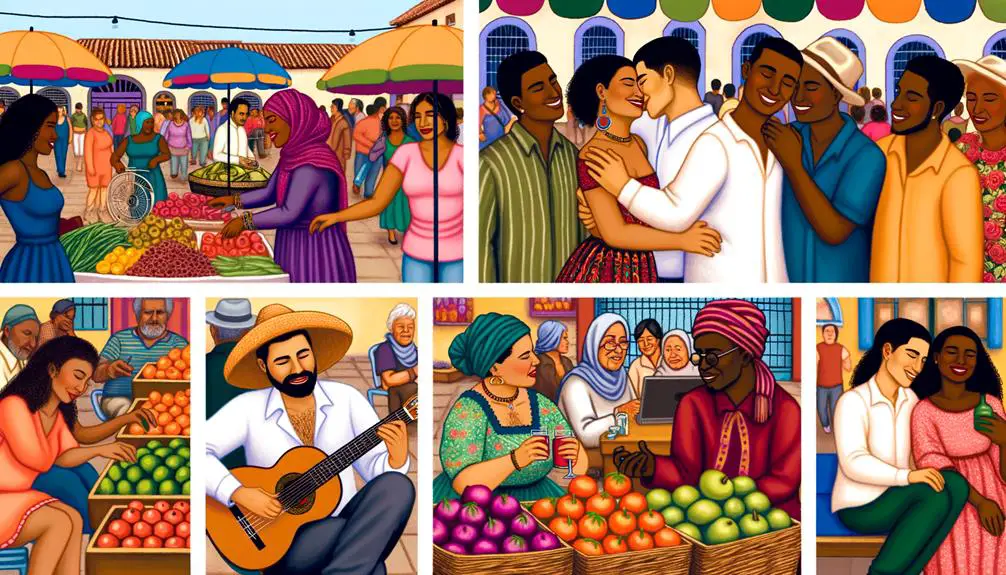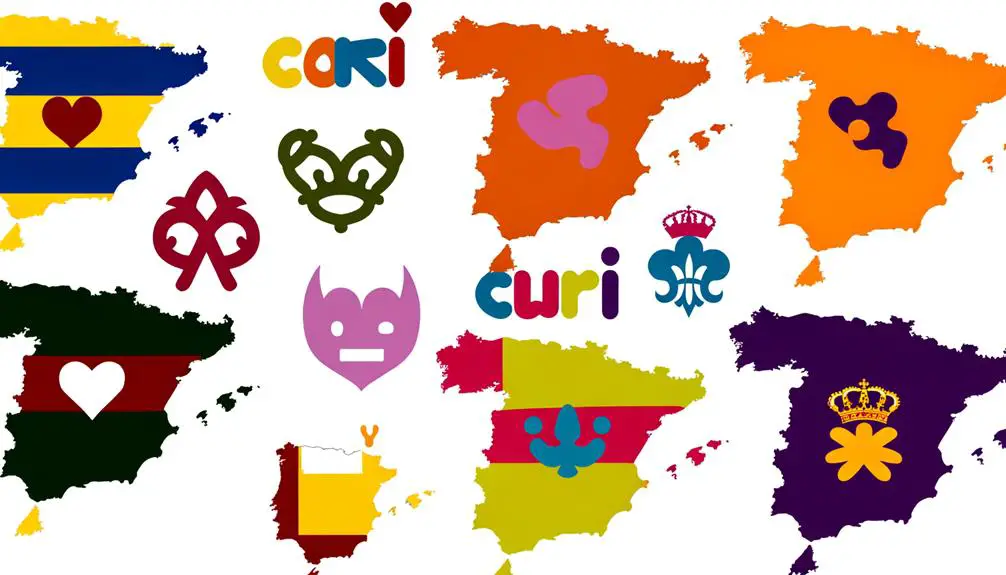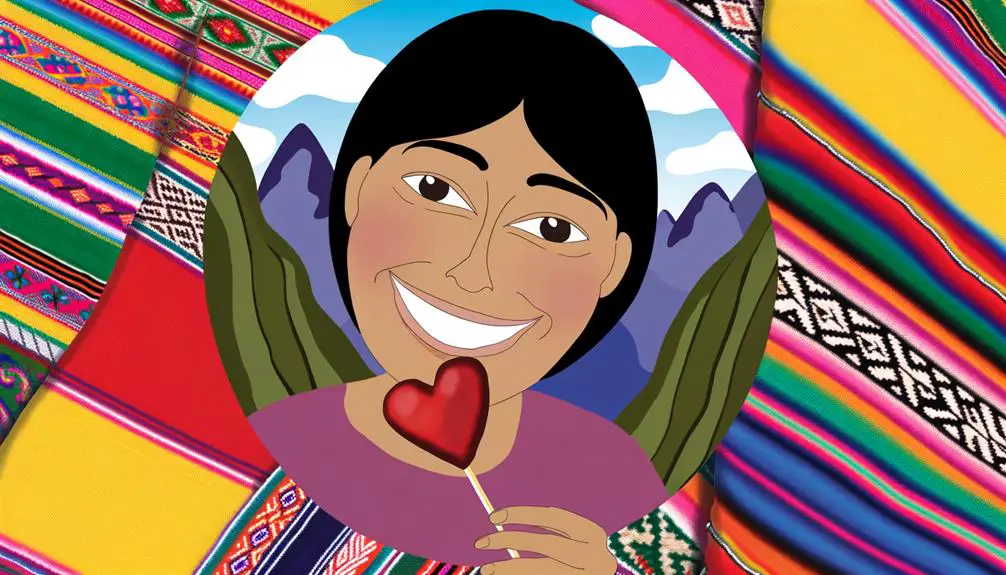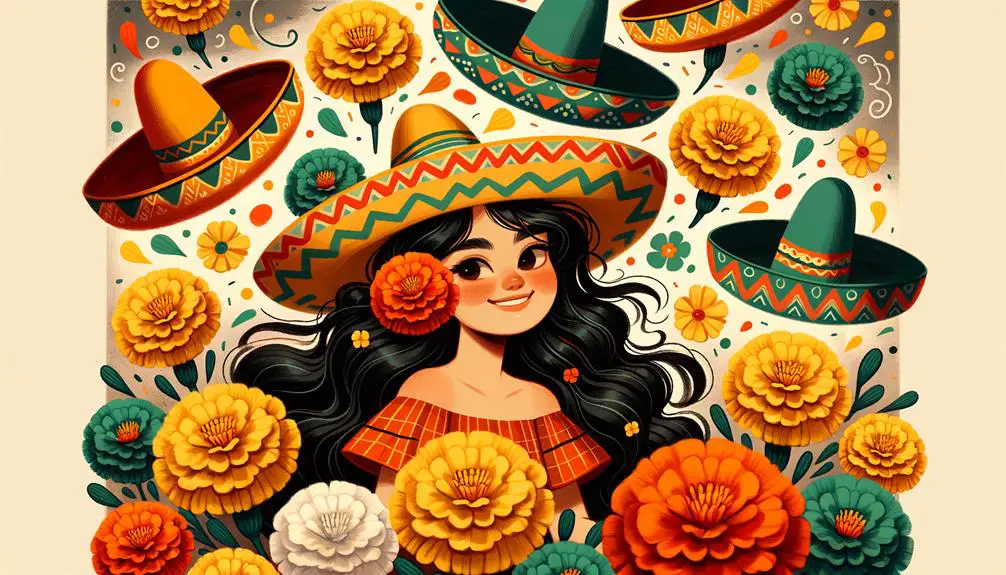When you want to address someone as a 'cutie' in Spanish slang, you'll find that different countries and regions have their own unique terms of endearment. In Latin America, you might use 'mi corazón' in Mexico, 'principito' in Colombia, or 'pololo' in Chile. In Spain, you could say 'cielo' or 'corazón'. In Peru, 'chulo' or 'pichu' might be your go-to terms. Each region has its own flair, and understanding these nuances can help you connect with locals on a deeper level. As you explore these terms, you'll uncover the cultural heritage and linguistic nuances that make each one special.
Terms of Endearment in Latin America

In Latin America, you'll often hear terms of endearment that are unique to each country, reflecting the region's rich cultural diversity. From 'mi corazón' in Mexico to 'mi cielo' in Argentina, each country has its own special way of expressing affection. These terms aren't just cute phrases – they reveal cultural nuances that set each country apart.
For instance, in Colombia, 'principito/principita' (little prince/little princess) is a popular term, reflecting the country's strong family values.
As you navigate the world of Latin lovers, understanding these terms can help you better connect with the locals. In Chile, 'pololo/polola' (boyfriend/girlfriend) is commonly used, while in Peru, 'mi vida' (my life) is a romantic favorite. These phrases aren't just empty flattery; they speak to the region's deep-seated passion and warmth.
Sweet Nothings in Spain
You'll discover a rich vocabulary of affectionate expressions in Spain, where terms like 'cielo' (heaven) and 'corazón' (heart) are staples in everyday conversation. These sweet nothings are woven into the fabric of Spanish culture, making it easy to express love and affection.
| Spanish Whispers | English Translation | Romantic Level |
|---|---|---|
| Cielo | Heaven | |
| Corazón | Heart | |
| Mi vida | My life | |
| Querido/a | Darling | |
| Amor mío | My love |
In Spain, it's common to use these love phrases in daily conversations, especially among loved ones. You might hear a Spanish whisper like "Eres mi cielo" (You're my heaven) or "Eres mi corazón" (You're my heart). These phrases are not only romantic but also a way to show affection and appreciation. By incorporating these love phrases into your conversations, you'll sound like a native Spanish speaker and make your loved ones feel special.
Chulo and Chula Explained

When exploring the world of Spanish slang, you'll come across 'chulo' and 'chula,' two terms that have become staples in everyday conversation, particularly among younger generations. These words have origins in Latin American culture, where they're used to express admiration or affection towards someone or something. In Spain, however, the meaning takes on a slightly different tone.
In Spain, 'chulo' is often used to describe someone who's stylish, fashionable, or charming. It's a term of endearment, similar to 'cutie' or 'hunk.'
On the other hand, 'chula' is used to describe a woman who's not only stylish but also confident and outgoing. However, there's a fine line between using 'chula' as a compliment and perpetuating stereotypes. Some people associate 'chula' with certain negative stereotypes, such as being loud, flashy, or overly dramatic.
Being mindful of these connotations when using these terms can help avoid perpetuating harmful stereotypes. By understanding the nuances of 'chulo' and 'chula,' you'll be better equipped to navigate everyday conversations in Spanish-speaking cultures.
Cariñosito and Cariñosa Uncovered
Cariñosito and cariñosa, the affectionate Spanish terms, capture the essence of tender affection, conveying a sense of sweetness and fondness towards someone or something. You'll often hear these words used in everyday conversations, especially among friends and family members. The suffixes '-ito' and '-ita' are added to the word 'carino' to create these cute diminutives, which convey a stronger sense of affection.
When you use cariñosito or cariñosa, you're expressing a deeper level of fondness and affection. For example, 'mi cariñosito' means 'my sweetie' or 'my darling,' while 'mi cariñosa' means 'my sweet one' or 'my dear.' These terms are often used to address someone you hold dear, like a loved one, a close friend, or even a pet.
In Spanish culture, using affectionate suffixes like '-ito' and '-ita' is a common way to express endearment. By adding these suffixes to nouns, you can create cute diminutives that convey a sense of fondness and affection.
Regional Nicknames for Loved Ones

Across different regions in Spain and Latin America, people use a variety of affectionate nicknames to address their loved ones, reflecting the diversity of cultural heritage and linguistic nuances.
You'll find that these regional nicknames not only vary in pronunciation but also in meaning, showcasing the rich tapestry of cultural endearments.
In Spain, for instance, you might hear 'cielo' or 'corazón' (meaning 'sky' and 'heart,' respectively) used as terms of endearment.
In some Latin American countries, like Argentina and Uruguay, 'boludo/a' is a common affectionate term, similar to 'sweetheart' in English.
You might also come across 'chulo/a' in Peru, which roughly translates to 'cute' or 'pretty.'
These regional dialects and cultural nuances give way to unique sweethearts' dialect, where words take on special meanings in romantic relationships.
As you explore these regional nicknames, you'll discover that they're not just cute phrases – they're a reflection of the cultural heritage and history of each region.
Heartfelt Expressions in Mexico
In Mexico, you'll frequently hear affectionate terms like 'mi corazón' (my heart) or 'mi vida' (my life) used to express deep affection and love. These heartfelt expressions are an integral part of Mexican culture, and you'll often hear them used in everyday conversations.
Mexican Sweethearts are known for their romantic gestures, and 'corazón moments' are a staple of Mexican relationships. But what exactly do these terms mean, and how are they used?
| Term | Translation | Meaning |
|---|---|---|
| Mi corazón | My heart | A term of endearment, similar to 'sweetheart' or 'darling' |
| Mi vida | My life | A phrase used to express deep affection and devotion |
| Cielo | Heaven | A term used to describe someone or something as perfect or wonderful |
These heartfelt expressions are a key part of Mexican culture, and understanding them can help you connect with the people and the language. By incorporating these terms into your vocabulary, you'll be able to express your feelings in a more authentic and meaningful way.
Cute and Quirky Argentine Terms

You'll explore a plethora of affectionate terms in Argentine Spanish, where locals affectionately use quirky and cute expressions to address their loved ones. In Buenos Aires, the capital city's charm shines through in the way people interact with each other.
You'll hear terms like 'boludo' or 'boluda' (meaning 'dude' or 'pal'), which may seem informal, but are actually terms of endearment. The Lunfardo slang, originating from Italian immigrants, has greatly influenced the Argentine dialect. This unique blend of languages has given rise to adorable expressions like 'gordo' or 'gorda' (meaning 'fat one,' but used as a term of affection).
You might also come across 'pibe' or 'piba,' which are affectionate terms for a young boy or girl. As you explore further into Argentine culture, you'll discover more of these charming expressions that reflect the country's warm and welcoming nature.
Colombian Slang for Cute People
As you explore the vibrant world of Colombian Spanish, you'll find affectionate terms like 'mono' or 'mona', which mean 'cutie' or 'sweetie', and are commonly used to express fondness towards loved ones. These terms are often used in everyday conversations, especially among friends and family, to show affection and endearment.
In Colombia, you'll also come across regional variations of cute nicknames. For instance, in the Paisa region, you might hear 'Paisa pichón', which is a term of endearment used to express admiration or fondness towards someone. This term is particularly popular in cities like Medellín and Antioquia.
In Bogotá, the capital city, you'll notice a distinct Cachaco charm, where locals use terms like 'cachaco' or 'cachaca' to refer to someone or something they find charming or endearing. These regional variations add to the richness and diversity of Colombian Spanish, making it a fascinating language to learn and explore.
Peruvian Terms of Affection

Delving into the rich cultural heritage of Peru, you discover a plethora of affectionate terms that reflect the country's warm and expressive nature. In Peru, endearments are an integral part of daily life, and you'll often hear them used in casual conversations.
Here are some Peruvian terms of affection you might find useful:
| Term | Meaning | Usage |
|---|---|---|
| Pichu | Cute, little one | Used to address a child or a loved one in a playful manner |
| Corazón | Heart, sweetheart | A term of endearment used to address a loved one |
| Mijo/Mija | My son/daughter | Used to address a younger person, similar to "kiddo" |
| Lima sweethearts | A term used to describe couples or romantic partners in Lima | |
| Chibolo/Chibola | Young boy/girl | Used to address a young person in an affectionate manner |
In Peru, affectionate terms are often used to show love, care, and appreciation. Using these terms can help you connect with the locals and show your love and affection in a culturally appropriate way.
Cute and Charming in Central America
Central America, a region known for its vibrant culture and warm hospitality, has its own unique set of terms to express cuteness and charm. As you explore the region, you'll discover that each country has its own way of expressing affection and admiration.
In Costa Rica, you'll often hear 'mi corazón' (my heart) or 'mi amor' (my love), which convey a sense of endearment and Costa Rican charm. In Nicaragua, you might hear 'mi vida' (my life) or 'mi cielo' (my heaven), which capture the essence of Nicaraguan sweetness.
These terms aren't just limited to romantic relationships; they're also used to express affection towards friends and family.
As you interact with locals, you'll notice that these terms are often used in everyday conversations, adding a touch of warmth and familiarity to interactions. You might even find yourself adopting these terms as you immerse yourself in the local culture.
Frequently Asked Questions
Can I Use Spanish Slang Terms With People I Don't Know Well?
When you're traveling, you wouldn't wear a swimsuit to a business meeting, right? Similarly, using informal Spanish slang terms with people you don't know well can be like wearing the wrong outfit – it can cross formal boundaries.
Social norms dictate that you reserve casual language for close relationships. Stick to formal language with acquaintances to show respect and avoid misunderstandings.
Are There Any Cultural Taboos Around Using Cute Nicknames?
When utilizing cute nicknames, you'll need to take into account cultural norms and social acceptability. In some cultures, terms of endearment are reserved for close relationships, and using them with strangers or acquaintances can come across as insincere or even disrespectful.
Be mindful of your audience and the context in which you're using these terms. In general, it's best to gauge the other person's comfort level before using affectionate language, especially in professional or formal settings.
Do Spanish Speakers Use English Loanwords for Cute Expressions?
As you navigate the complex landscape of language, imagine a river flowing through cultures, shaping and reshaping expressions. You might wonder, do Spanish speakers adopt English loanwords for cute expressions?
The answer lies in the currents of Language Evolution and Cultural Assimilation. As languages intersect, they exchange words, adapting to the tides of globalization. Spanish speakers do use English loanwords, incorporating them into their linguistic landscape, blending cultures and creating new forms of endearment.
How Do I Pronounce the Ñ in Cariñito and Cariñosa Correctly?
When pronouncing the ñ in cariñito and cariñosa, you'll want to focus on the correct accent. Pay attention to the ñ sound, which is a blend of 'ny' and 'y' sounds.
To get it right, practice saying 'on-yah' and 'kah-ree-nyoh-tah' for cariñito, and 'kah-ree-nyoh-sah' for cariñosa.
Pronunciation tips: use a gentle, soft tone and avoid over-emphasizing the ñ. Accent importance lies in mastering this subtle sound to sound more natural in Spanish conversations.
Are There Any Regional Differences in Using Slang Terms for Flirting?
When exploring slang terms for flirting, you'll notice regional differences that reflect dialectical variations.
Across Latin America and Spain, you'll encounter distinct regional nuances in the way people express affection or attraction.
For instance, in Mexico, 'chulo' or 'chula' are common terms of endearment, while in Argentina, 'boludo' or 'boluda' are used to express admiration.
Understanding these regional differences can help you better navigate social interactions and avoid misunderstandings.







